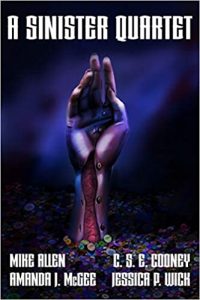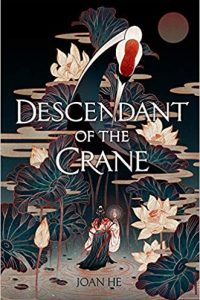Ian Mond Reviews Like Smoke, Like Light by Yukimi Ogawa
 Like Smoke, Like Light, Yukimi Ogawa (Mythic Delirium 978-1-95652-200-6, $17.95, 260pp, tp) June 2023.
Like Smoke, Like Light, Yukimi Ogawa (Mythic Delirium 978-1-95652-200-6, $17.95, 260pp, tp) June 2023.
Yukimi Ogawa is an exophonic writer. Don’t worry if you’re unfamiliar with the term; so was I until I discovered (via Google) that ‘‘exophonic’’ refers to authors who write in their second language. Ogawa is Japanese but writes in English, a language she rarely speaks. It sets her apart from other exophonic luminaries like Vladimir Nabokov, Jack Kerouac, and Samuel Beckett, who regularly spoke in their second language. In a piece for ‘‘The Big Idea’’ on John Scalzi’s website, Ogawa says the reader will ‘‘probably’’ know she isn’t fluent in English: ‘‘I still fumble for command of it.’’ She’s wrong. Not that she might struggle with English, but that the reader can tell. The seventeen stories collected in her debut collection, Like Smoke, Like Light, are written with a lyricism, sophistication, and vibrant imagination that speaks to a writer in complete control of her craft.
In her introduction to Like Smoke, Like Light, Francesca Forrest – who accurately describes Ogawa as a ‘‘remarkable light in the science fiction and fantasy firmament’’ – helpfully informs us that Ogawa’s fiction can be split into three categories:
[Stories] whose protagonists are ghosts or other types of yōkai (phantoms) out of Japanese tradition, [stories] set on an island where some people are born patterned and dramatically colored (indigo, plum, new-leaf green), and a handful of other [stories] that don’t fall easily into those two categories.
The opening piece, which happens to be the title story, falls into the first category: a tale of the yōkai. The disgraced daughter of a powerful family is coerced into tending to the family’s first son, hidden away in an annex where he stares into a void awaiting the appearance of his dead wife and child. It’s a disquieting piece of writing, not so much because of the atmosphere (though it is suitably eerie) but because of what the story has to say about oppression and power, whether it be our protagonist punished for seeking freedom or the ghosts, former servants bound to the family even in death. It’s a theme we see crop up repeatedly in Ogawa’s fiction.
While I liked all the yōkai tales, I particularly enjoyed ‘‘Hundred Eyes’’, with its disconcerting opening line: ‘‘Eyes, eyes, eyes. So many eyes on my long arms’’, and the wonderfully bizarre ‘‘The Flying Head at the Edge of Night’’, where a body and its dismembered head save a young woman from a terrible fate. My favourite tale of the yōkai also recasts the monster as saviour. ‘‘Rib’’ sees a living skeleton who sips on the life force of the men whom she fools into believing she’s alive, looking out for a young boy, Kiichi, whose mother was brutally murdered. I’m not sure how Ogawa pulls it off, but the relationship between Kiichi and the lady skeleton – which involves breaking into a temple to get back Kiichi’s mother’s hair stick – is somehow both touching and macabre.
With a science fiction bent, the second category of stories, comprising at least a third of the collection, take place on an island where some of the population are born patterned – their skin striated with various colours. As we learn in ‘‘The Colorless Thief’’ – where the main character needs to be beaten for her pattern to appear – the unique colours they produce are both a tourist attraction and sought by the wealthy and elite. ‘‘The Colorless Thief’’ was Ogawa’s first attempt to write an ‘‘Island Story’’, and it’s much harsher and darker than subsequent pieces. This includes a terrific trilogy of stories featuring Kiriko and her mentor, colourless ateliers, who design and modify new patterns to heal their coloured patrons. Francesca Forrest compares their investigations to the show House; the vibe strongly reminded me of CSI. The ‘‘Island Stories’’, and especially the adventures of Kiriko and her mentor (who deserve a novel of their own), uncover the prejudice and exploitation at the heart of island society: whether it be the colourless like Kiriko or the patterned androids that do the island’s menial work. They share this with the yōkai tales, which also consider the effects of oppression, the powerful over the powerless. But Ogawa doesn’t just highlight injustice. In the yōkai tales and ‘‘Island Stories’’, she centres on the individuals – ghosts, skeletons, ateliers and androids – willing to assist those facing persecution.
There’s one final category: the standalone stories. They are uniformly excellent, with vastly different tones. There’s the gruesome ‘‘Perfect’’, where an older woman steals the striking features of those she meets in a bid to renew herself; the hilarious ‘‘Town’s End’’, where an employee at a marriage agency first unwittingly and then knowingly, helps a group of Celestial beings procreate with humans; and there’s the tragic ‘‘Nini’’, where the titular protagonist – a humanoid AI built to aid the elderly on a far-flung space station – discovers how truly horrible and intolerant people can be toward the ‘‘other.’’ Then there’s ‘‘The Tree, and the Centre of the World’’, the only original piece in the collection. It would be a mug’s game to attempt to describe this story involving a remarkable tree and its eternal caretaker situated slap-bang in the middle of reality. But along with ‘‘Nini’’, it reminded me of the work of Karin Tidbeck: science fiction that’s weird and organic and unconventional; science fiction that isn’t so much in conversation with the tropes of the genre but instead ploughing its own unique path. ‘‘The Tree, and the Centre of the World’’ is the perfect conclusion to Like Smoke, Like Light, a story that show-offs Ogawa’s vivid imagination, her compassion, and her desire for a fairer world.
Ian Mond loves to talk about books. For eight years he co-hosted a book podcast, The Writer and the Critic, with Kirstyn McDermott. Recently he has revived his blog, The Hysterical Hamster, and is again posting mostly vulgar reviews on an eclectic range of literary and genre novels. You can also follow Ian on Twitter (@Mondyboy) or contact him at mondyboy74@gmail.com.
This review and more like it in the August 2023 issue of Locus.
 While you are here, please take a moment to support Locus with a one-time or recurring donation. We rely on reader donations to keep the magazine and site going, and would like to keep the site paywall free, but WE NEED YOUR FINANCIAL SUPPORT to continue quality coverage of the science fiction and fantasy field.
While you are here, please take a moment to support Locus with a one-time or recurring donation. We rely on reader donations to keep the magazine and site going, and would like to keep the site paywall free, but WE NEED YOUR FINANCIAL SUPPORT to continue quality coverage of the science fiction and fantasy field.
©Locus Magazine. Copyrighted material may not be republished without permission of LSFF.








